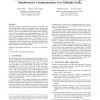Free Online Productivity Tools
i2Speak
i2Symbol
i2OCR
iTex2Img
iWeb2Print
iWeb2Shot
i2Type
iPdf2Split
iPdf2Merge
i2Bopomofo
i2Arabic
i2Style
i2Image
i2PDF
iLatex2Rtf
Sci2ools
116
click to vote
PPOPP
2006
ACM
2006
ACM
Collective communication on architectures that support simultaneous communication over multiple links
Traditional collective communication algorithms are designed with the assumption that a node can communicate with only one other node at a time. On new parallel architectures such as the IBM Blue Gene/L, a node can communicate with multiple nodes simultaneously. We have redesigned and reimplemented many of the MPI collective communication algorithms to take advantage of this ability to send simultaneously, including broadcast, reduce(-to-one), scatter, gather, allgather, reduce-scatter, and allreduce. We show that these new algorithms have lower expected costs than the previously known lower bounds based on old models of parallel computation. Results are included comparing their performance to the default implementations in IBM’s MPI. Categories and Subject Descriptors D.m [Software]: Miscellaneous General Terms Algorithms, Performance
Collective Communication Algorithms | Distributed And Parallel Computing | MPI Collective Communication | Node | PPOPP 2006 |
Related Content
| Added | 14 Jun 2010 |
| Updated | 14 Jun 2010 |
| Type | Conference |
| Year | 2006 |
| Where | PPOPP |
| Authors | Ernie Chan, Robert A. van de Geijn, William Gropp, Rajeev Thakur |
Comments (0)

